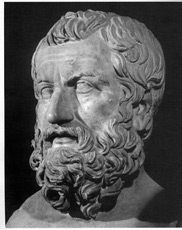What goes to make the universe
 Nearly two-thirds of the earth is covered by water in oceans, seas,
rivers, lakes and streams. The human body too contains a large amount of
water. There is water in vegetables and fruit in small quantities.
Islands, countries and continents are surrounded by water. All these
mean that water plays a dominant role in all natural creations. Nearly two-thirds of the earth is covered by water in oceans, seas,
rivers, lakes and streams. The human body too contains a large amount of
water. There is water in vegetables and fruit in small quantities.
Islands, countries and continents are surrounded by water. All these
mean that water plays a dominant role in all natural creations.
Thales of Miletus (c. 624-546 BCE) was the first philosopher to say
that everything is made of water. He formulated his theory from
observation of specific weather conditions. He was born at a time when
the Greek peninsula was gradually settling itself into city states. Even
during this archaic period, the Greeks had developed an alphabet and the
art of writing. The people followed primitive religions and believed
that natural phenomena were governed by a pantheon of gods.
Thales was born in Miletus on the coast of what is now Turkey.
Although none of his writings survived, he is believed to be the first
Greek philosopher who laid the foundation for Western philosophy. Even
Aristotle and Diogenes Laertius who lived about two centuries later have
referred to him. According to anecdotal evidence, Thales was actively
involved in philosophy. What is more, he was a very successful
businessman. Thales travelled widely and in one of his visits to Egypt
he learnt practical geometry which later became the basis of deductive
reasoning.
Politician
Apart from being a philosopher, businessman and politician, Thales
was an eminent teacher. He set up his Milesian School of Philosophy
which produced the well-known philosopher Anaximander. His pupil
Anaximenes is believed to have taught Pythagoras, the mathematician.
Wondering what was the basic material that went to make the universe,
Thales concluded that water is clearly necessary to sustain all forms of
life. He said that water is a substance that is constantly on the move
and subject to change. For instance, in oceans, seas, rivers and lakes
water is found in liquid form. In the Arctic, water is turned into solid
ice. If you visit the upcountry, you will see water in the form of mist
or fog. Therefore, it is correct to say that water is the basis of all
life.
|

Anaximenes: The underlying
element of everything is air. |
Thales goes down in history not because of his observations relating
to water. Today we remember him as the first known philosopher in
pre-Socratic Greece. He was ahead of his time when he said that we have
to find rational answers to fundamental questions without ascribing them
to gods.
Religion
Thales, however, was not an atheist. He said the mind of the world is
God. He felt that God is intermingled in all things, a view that
appealed to many religions. He was a modern thinker in more ways than
one, pre-empting many ideas in religion, philosophy and science.
In one of his earliest “absent-minded professor” stories, Plato
records that Thales fell into a well “when he was looking up to study
the stars ...being so eager to know what was happening in the sky he
could not see what lay at his feet.”
By trying to pin down everything to water, Thales’ philosophy has
been branded “Monism,” the belief that reality is essentially one. His
“water theory” rested on systematic and rational evidence fortified with
scientific observations. What is great about him is that he invited
others to refine his theory or reject it toto.
Rational explanation
When Thales claimed that the earth floats on water, his pupil
Anaximander offered a more rational explanation. He said the earth stays
where it is because it is at the precise centre of the universe. He said
the earth is not resting on anything. Anaximander also said that the
earth was fluid in the beginning. An external source of heat dried some
parts of it. Variations in temperature caused winds and living organisms
came into being at various stages.
Thales’ direct legacy culminated in Anaximander’s pupil, Anaximenes
who said that the underlying element of everything is air, not water.
According to him, pure air becomes progressively denser through the
process of condensation. For instance, air becomes fire, wind, cloud,
water, earth and stone. This shows that there is a single world order.
Today modern philosophers and scientists have gone beyond Thales’ and
Anaximenes’ water and air theories. However, they were great men to have
given some thought on matters relating to human life and the universe.
|

